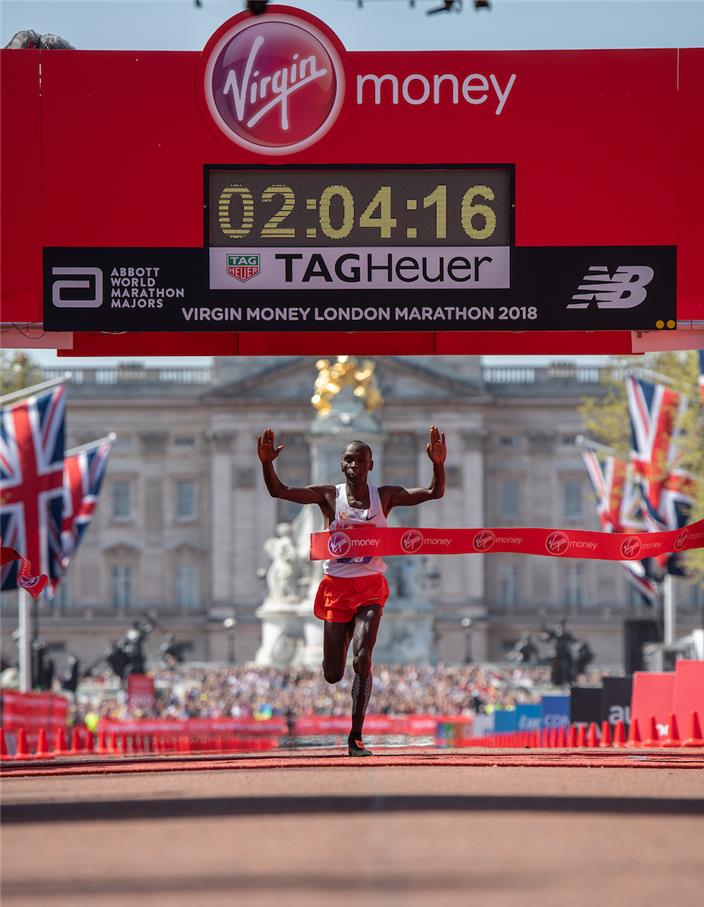The 40th London Marathon to be a 'beacon of light'

The 2020 Virgin Money London Marathon can be ‘a beacon of light in the darkness’ of the Covid-19 pandemic, according to event director Hugh Brasher just days ahead of The 40th Race, set to be run on a closed-off, biosecure course in central London on Sunday 4 October.
The Virgin Money London Marathon is only the second Abbott World Marathon Majors event to be staged this year, following the elite-only Tokyo Marathon in March and the cancellation of races in Boston, Berlin, Chicago and New York City.
First held in 1981, this year’s London race will be like no other in the event’s history, according to Brasher, with four elite able-bodied and wheelchair races taking place on the new looped course comprising 19.6 laps of St James’s Park, while 45,000 runners around the globe aim to complete 26.2 miles during a 24-hour period from midnight to midnight on Sunday.
“We are delighted and incredibly proud to be able to hold this event during a worldwide pandemic,” said Brasher. “We have the world’s greatest athletes plus 45,000 other runners doing it their way from their homes, wherever they are.
“It will be a 40th race that lives long in the memory for being different, but also for being an inspirational event in these difficult times.
“We hope we can be a beacon of light in the darkness, that in our way we can bring people together, even while people have to run apart. We all need something to inspire us, to give us hope for the future. And we are trying to give people something to inspire them, for their mental and physical health.
“We can’t have 750,000 spectators around the course as we usually do, but we’ll have eight hours, 20 minutes of BBC coverage showing the greatest men’s field, the greatest women and the greatest wheelchair racers, plus many amazing stories of everyday people running for amazing causes.
“This is about trying to show we can still work together to put on an event in these times, that we can still come together even though we are forced to be apart.”
The 2020 elite fields include most of the runners who had signed up to compete on 26 April before its pandemic-enforced postponement – including the two fastest marathon men of all time, Eliud Kipchoge and Kenenisa Bekele, plus women’s world record breaker Brigid Kosgei, and legendary wheelchair racers David Weir and Manuela Schär.
With a flat, super-fast course, expertly paced races and more frequent drinks and information points for the athletes, Brasher believes record-breaking performances could well be on the cards, despite the predicted Race Day rain.
“Heavy rain is not ideal conditions for world records,” said Brasher, who admitted he was doing ‘the opposite of a rain dance’ ahead of the weekend.
“We can’t control the weather, but what we do have is great athletes in great shape. They have been training in unique conditions because of the Covid restrictions and that means this is probably the most difficult marathon to predict.
“But whatever the conditions, we believe there will be some incredible racing, and it could be incredibly quick.
“And they couldn’t be in a more iconic location,” he added, “starting and finishing on The Mall and running in front of Buckingham Palace in the heart of this great city.”
One athlete who won’t be on the Start Line is Degitu Azimeraw, last year’s Amsterdam Marathon champion, who tested positive for Covid-19 while still at home in Ethiopia.
All elite racers were tested before leaving home for their secret, Covid-safe hotel location outside London, and again on arrival at the hotel on Monday to enter the event’s ‘biosecure bubble’.
Azimeraw is the only athlete to test positive so far, while the coach of 2018 London marathon runner-up, Shura Kitata, also remained in Ethiopia following a positive result.
Among the other Covid safety measures in what Brasher described as the event’s ‘new regime’ is innovative ‘bump technology’ – worn by every athlete, official and staff member inside the bubble – that ensures social distancing via audible and visible warnings, and can retrospectively track each person’s contacts in the event of a positive test.
“We’ve learned all we can from other sports such as Formula 1 and test cricket about biosecure bubbles and have done everything we can to protect the athletes’ safety,” said Brasher. “This is part of the new world we’re living in.
“In the end, we are just delighted to be able to hold our 40th event this year and we hope the inspiration will shine through on Sunday.”
Photograph credit from Virgin Money London Marathon
